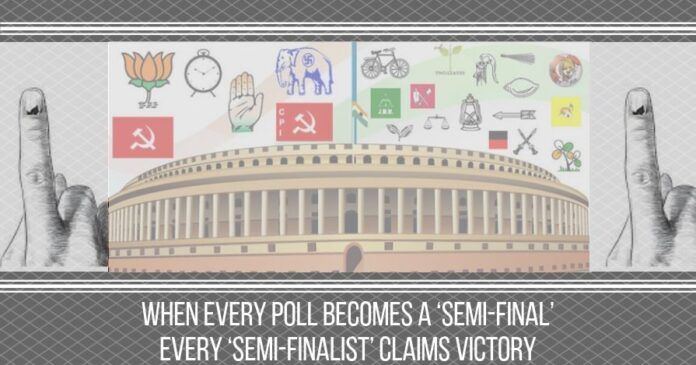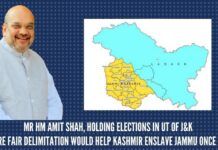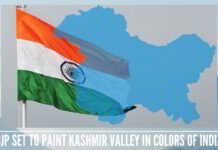
Maybe it’s time to stop playing the ‘semi-final’ game at the drop of a hat, every State election or a by-poll is different and has its own importance and consequence
In tournaments across the world, there are two semi-finals and one final. The electoral tournament in India too has one final, the Lok Sabha election. However, political pundits, the media and even sections of the political setup have been magnanimous in branding every other election that happens prior to the final, as a semi-final. The result is that people have to not just contend with several semi-finalists but also scratch their heads on determining who the eventual finalists are.
But experts had by then fallen in love with the term, ‘semi-final’. Thus, when the Uttar Pradesh Assembly election took place last year, it was hailed as a semi-final too
The Lok Sabha poll is due in April-May 2019. One finalist is evident: The Bharatiya Janata Party-led NDA. The second is unclear. The confusion is due to the many ‘semi-finals’ and their different winners. Months after the NDA stormed to power in 2014, the Aam Aadmi Party swept the Delhi Assembly election. That was the first semi-final, and experts began to predict that the AAP, with its footprints also in Punjab, could be a formidable semi-finalist. Then came the Bihar Assembly election, which too was considered a semi-final. The BJP lost that too, and a grand alliance of the RJD, the Congress and the Janata Dal (United) triumphed. Soon enough, the grand alliance became the semi-finalist. We have seen how these two semi-finalists have fared over the years since then. The AAP has virtually lost ground in Punjab and its national ambitions lie in tatters. There is no way that a Delhi-based party can challenge a national behemoth at the Centre. The Bihar alliance was recently ripped apart recently, with the JD (U) returning to the NDA fold.
But experts had by then fallen in love with the term, ‘semi-final’. Thus, when the Uttar Pradesh Assembly election took place last year, it was hailed as a semi-final too. The BJP romped home with a convincing win. One would have hoped that the semi-final was done within the State, but that was not to be. A clutch of by-polls which happened later there too became a semi-final. When the BJP suffered a shock defeat, it was as if the BJP had already lost the final. Suddenly, another grand alliance, with the Samajwadi Party, the BSP and the Congress occupied centre-stage. Today, that euphoria has evaporated. The BSP is contesting a bunch of coming State polls on its own and against the Congress. The BSP-SP alliance is still there, but not formalised in Uttar Pradesh for the 2019 Lok Sabha election.
Despite all the surge that the pre-poll surveys have been showing for the Congress, the party chief Rahul Gandhi continues to trail far behind Narendra Modi in the choice for the country’s next Prime Minister.
And yes, predictably, the Karnataka Assembly poll was also a semi-final. There were no alliances and it was a three-way contest. While the BJP emerged as the single-largest party, the Janata Dal (Secular) and the Congress joined hands to form the Government. Alone BSP legislator too was part of the coalition. Once more, talk of a grand alliance semi-finalist taking on the BJP began doing the rounds. The situation today is less happy for the so-called semi-finalist. The Karnataka Chief Minister, who, by his own admission, has been compelled to consume the “poison” of a partnership with the Congress, is far from happy, and the BSP has quit the coalition.
Is it any wonder now, that the forthcoming Assembly polls to Madhya Pradesh, Rajasthan and Chhattisgarh are also being seen as a semi-final to the 2019 battle! It has become a norm to assume that the outcomes in State elections — and those of by-polls — are decidedly going to determine the Lok Sabha contest result. There is no doubt that the results come as a boost to the winners and revitalise the victorious parties to take on the finalist. But that’s it. People do vote differently in national and State polls. The BJP had swept all the seven seats in Delhi in the 2014 Lok Sabha election but lost the Assembly poll. In the more recent case, various opinion polls have been projecting losses for the BJP in the Assembly elections, but these surveys have also been predicting wins for the BJP from these very States in the 2019 general election. And, despite all the surge that the pre-poll surveys have been showing for the Congress, the party chief Rahul Gandhi continues to trail far behind Narendra Modi in the choice for the country’s next Prime Minister.
Maybe it’s time to stop playing the ‘semi-final’ game at the drop of a hat. Every State election or a by-poll is different and has its own importance and consequence (for instance, in how it could eventually impact numbers in the Rajya Sabha). But elevating it to a ‘semi-final’ level is hyperbolic.
Note:
1. The views expressed here are those of the author and do not necessarily represent or reflect the views of PGurus.











Thanks As Usual Well Penned Kudos ?? ?? ?